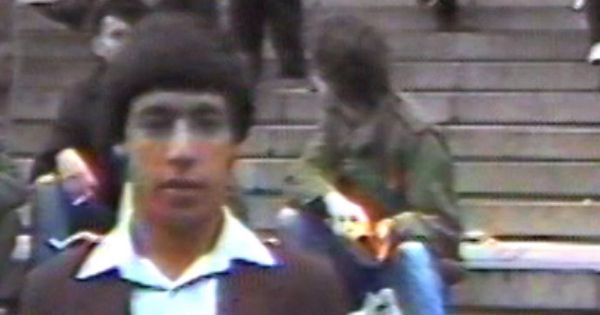Eye For Film >> Movies >> Idrish (2021) Film Review
Idrish
Reviewed by: Andrew Robertson

"There is no record of my birth," he says, he says his mother told him it was "the year of Pakistan", "on the day of Eid". That means he was "born a free citizen," but within that statement are all manner of complexities.
Built of a mixture of footages, opening with the stentorian intonation of "the rebel eternal", the confluence of ages. "a sleepy little town called Faridpur", murals of refreshing drinks, flares and steams from striped stacks, traditional dress and training shoes. Animated butterflies over skies that might be archive, the grain of film lending to any era a distance. This is a similarly mixed story, as much a jumble as the Dragon-Ball Z stickers on a door that might be some hundred years old. An act of scholarship, contrast, as profound as the opportunity that brought Mohammad Idrish to England. On arrival, immigration legislation began to work against him.
There are archive interviews to go with new ones. The sticker walks by with bovver boots over the details, but the essence is thus. In the intersection of immigration and family law, injustice not only grew but was a product of systemic intents. Protest followed. A trade union member, a volunteer for Barnardo's, married though in the process of divorce, Idrish's case became a focal point. It was (and is) clear that immigration rules treated black families "cruelly and grossly."
At Glasgow's 2022 Short Film Festival it was given special mention by the jury for its use of material and its heart. The international jury talked about its compelling use of found footage, its use to both elaborate and reveal. A charismatic portrait, it's a compelling film. In the time since those screenings, UK government policy has seen both the pathetic and the preposterous in the responses to the ongoing crisis in Ukraine and the proposals to use Rwanda as an 'offshore' settlement site. In an ideal world Adam Lewis Jacob's film would be a sad document, rather than a timely rallying cry. The use of footage of the Empire Windrush is indicative of the hypocrisy of it all. The British Empire was ever a colonial project, a project of oppression that was won from the playing fields of Eton and every other dehumanising institution. To take and not give back is the injustice of the drawbridge. From Idrish's campaign came other successes, but the institutions remain.
As do the injustices. There was a screening planned by Glasgow Short for May 2022, a year after the community action on Kenmure Street. That saw Sumit Sehdev and Lakhvir Singh freed from the custody of a Home Office squad by grassroots resistance. The screening is more proximate geographically than chronologically, though only three weeks after the anniversary it is at Glasgow's Tramway Theatre, just five minutes East on foot. While Idrish talks specifically of England, and indeed the "England [he] love[s]," these divisions are not devolved.
That alliteration is in part tribute to a film that uses poem and sound, Vernon & Burns Memory Clinic, Burman's Takdum Takdum Bajai, Nazrul Islam's Bidrohi. Old BBC programming, Here To Stay. Plenty of Union footage too, archive papers and custom typography.
In the words of the man himself: "the law is wrong, the law is racist, and you are not the only one in your situation and there are hundreds and thousands of people around you who will support you". Most importantly, "don't take it without a fight." Idrish gives not only the story of a fight but information about its tools. "The spirit of fight is the best part of life." The best part of documentary is to take an interesting story and tell it in an interesting way. Idrish does that. The greatest part of documentary, as with any story, is to change the world. Idrish yet might.
Reviewed on: 23 May 2022














